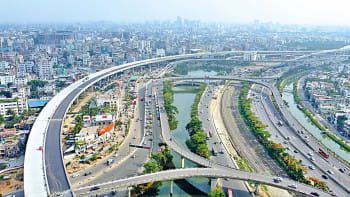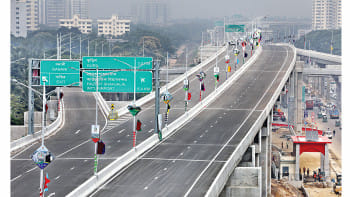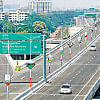Dhaka’s First Elevated Expressway: All set for grand opening
The long-awaited Dhaka Elevated Expressway is set to be inaugurated today partially, bringing new hope for easing the perennial traffic woes in the capital.
Prime Minister Sheikh Hasina will open the 11.5km airport-Farmgate section of the 19.73km expressway, the first one in the country, in the afternoon.
Once the structure is opened to traffic tomorrow, it would take around 10 minutes for vehicles to reach Farmgate from the airport, around 50 minutes less than what it takes now.
The partial opening of the expressway is taking place more than a decade after the project was taken up to ease the city's traffic jams.
This is the first project in the transport sector being implemented under the public-private partnership (PPP) with foreign investment.
The entire expressway is expected to be opened to vehicles next year.
"We have completed all preparations for the opening of the expressway by the prime minister," Bridges Division Secretary Monjur Hossain told The Daily Star on Thursday.
The PM's car will enter the expressway from the north end in Kawla area near the Hazrat Shahjalal International Airport and will pay toll at the toll plaza there, Monjur said.
Hasina will get off the expressway in Tejgaon area to join a civic rally at the old trade fare ground in Agargaon around 4:00pm.
The premier will inaugurate the expressway there, said Monjur, also the executive director of Bangladesh Bridge Authority (BBA).
Meanwhile, the authorities have already decorated the expressway with placards and flags. However, those will be removed before the opening of the structure to traffic at 6:00am tomorrow, sources said.
The project authorities said they have set up a control centre in Kuril area for smooth movement of traffic. Chinese firm China Shandong International Economic and Technical Corporation, one of the three private partners of the PPP project, will operate the control centre, they said.
The airport-Farmgate section via Kuril, Banani, Mohakhali and Tejgaon will serve as an alternative route to and from the airport, one of the busiest in the city.
This section with 15 ramps will help vehicles avoid traffic-choked crossings and roads. Thirteen of the ramps will be opened tomorrow.

The expressway will be off-limits to three-wheelers and motorcycles. Other vehicles will run on the structure at a maximum speed of 60km per hour at the beginning, according to sources.
The Dhaka Elevated Expressway is one of the two expressways now being built to reduce traffic congestion in the city.
The 20km Dhaka-Ashulia Elevated Expressway is being built on the Dhaka EPZ-Kawla route. At Kawla, it will be connected with the Dhaka Elevated Expressway which will link the Dhaka-Chattogram Expressway at Kutubkhali.
Experts said people will have to wait until the opening of both the expressways to get the full benefit of the structures.
Once the two expressways are operational, people from the country's northern, western and south-western regions will be able to avoid the capital's perennial traffic jams while travelling via Dhaka.
Trucks and lorries, which are now barred from entering the city during the day, will also use the expressways. The deadline of the Ashulia Elevated Expressway is June 2026.
PARTIAL OPENING AT LONG LAST
In January 2011, the BBA signed a deal with Italian-Thai Development Public Company to build the Dhaka Elevated Expressway at a cost of Tk 8,703 crore.
The agreement was revised and inked again in December 2013 with a revised cost of Tk 8,940 crore after bringing several changes to the design. According to the deal, the government will provide Tk 2,413 crore (27 percent) as "viability gap funding" while the private partner will bear the remaining cost.
Besides, the government is to spend Tk 4917.57 crore on land acquisition, resettlement and relocation of utility service lines, meaning the total cost of the project is Tk 13,857.57 crore.
But the scheme falteredtime and again over the years mainly due to the failure of Italian-Thai to manage funds and problems related to land acquisition, said officials involved in the project.
However, the fund-related crisis was resolved after Italian-Thai handed over 49 percent of its share to two Chinese companies -- China Shandong International Economic and Technical Corporation Group (34 percent) and Sino Hydro Corporation Ltd (15 percent) -- in 2020.

 For all latest news, follow The Daily Star's Google News channel.
For all latest news, follow The Daily Star's Google News channel. 











Comments